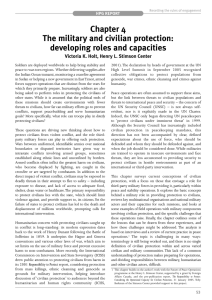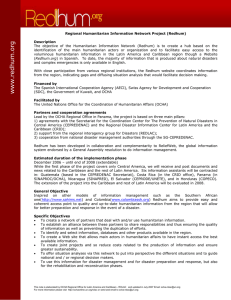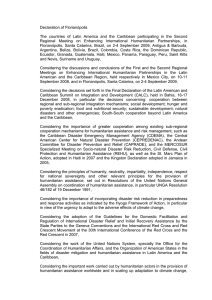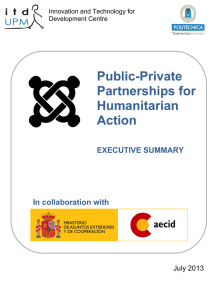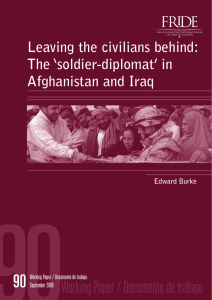8 Arce corregida.p65
Anuncio
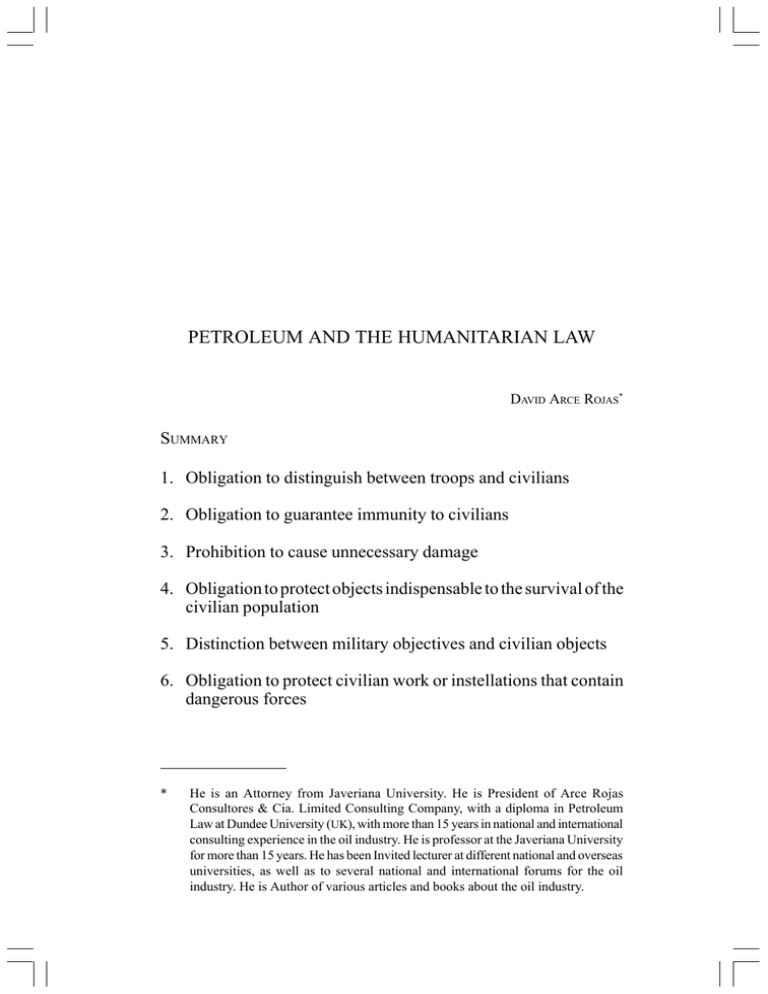
INTERNATIONAL 275 LAW PETROLEUM AND THE HUMANITARIAN LAW DAVID ARCE ROJAS* SUMMARY 1. Obligation to distinguish between troops and civilians 2. Obligation to guarantee immunity to civilians 3. Prohibition to cause unnecessary damage 4. Obligation to protect objects indispensable to the survival of the civilian population 5. Distinction between military objectives and civilian objects 6. Obligation to protect civilian work or instellations that contain dangerous forces * He is an Attorney from Javeriana University. He is President of Arce Rojas Consultores & Cia. Limited Consulting Company, with a diploma in Petroleum Law at Dundee University (UK), with more than 15 years in national and international consulting experience in the oil industry. He is professor at the Javeriana University for more than 15 years. He has been Invited lecturer at different national and overseas universities, as well as to several national and international forums for the oil industry. He is Author of various articles and books about the oil industry. 276 DAVID ARCE ROJAS 7. Obligation to protect to the environment 8. Obligation to take precaution measures upon the attack The oil industry has been objective of guerrilla’s attempt throughout the world in different countries like, Nigeria, Aserbayan, Colombia. These attacks are an infraction to the international humanitarian law. Actions like oil pipeline attacks, Rigs attempt, kidnappings, facilities destruction and damages to the civilian population are now a days more common in those areas where the oil industry is operating. This is the reason of this article, to point out the principles and laws that are violated by the guerrilla’s actions. The acts previously described are a flagrant violation of the fundamental principles of International Humanitarian Law, the Proportion and Distinction Principle, consigned in the Geneva Convention of 1949 and the Additional Protocols I and II of 1977. We are specifically dealing here with the obligation to distinguish between troops and civilians, the obligation to guarantee immunity to civilians, the prohibition to cause unnecessary damages, the obligation to protect objects indispensable to the survival of the civilian population, the mandate to distinguish between military objects and civilian objects, the obligation to protect civilian and military facilities that contain dangerous forces, the obligation not to use war methods which produce indiscriminate effects, and the obligation to protect the environment, which we shall examine one by one for a better legal understanding. 1. OBLIGATION TO DISTINGUISH BETWEEN TROOPS AND CIVILIANS This difference is one of the fundamental rules, and probably the most important one of International Humanitarian Law known as the Principle of Distinction. It is necessary to make certain the INTERNATIONAL LAW 277 condition of the adversary and to differentiate him from civilians, as well as the acts that characterize the soldier who by his nature intends to harm his adversaries’ troops and equipment. The Protocol II, in its Title II, “Human Treatment”, article 4 deals about “Fundamental Guarantees”, consigned this fundamental principle as follows: “All persons who do not take a direct part or who have ceased to take part in hostilities, whether or not their liberty has been restricted, are entitled to respect for their person, honor and convictions and religious practices. They shall in all circumstances be treated humanely, without any adverse distinction. It is prohibited to order that there shall be no survivors”. The main objective is to set aside civil population, as well as its belongings, to keep them away from military hostilities and the devastation caused by war, then, attacks must be limited against military personnel and military targets. This principle becomes more specific, when the distinction refers to human beings, and to their dignity, in numeral 2 of article 4 reads: With out prejudice to the generality of the foregoing, the following acts against the persons referred to in paragraph 1 are and shall remain prohibited at any time and in any place whatsoever: a) Violence to the life, health and physical or mental well-being of the persons, in particular murder as well as cruel treatment such as torture, mutilation or any form of corporal punishment; b) Collective punishment; c) Tanking of hostages; d) Acts of terrorism; e) Outrages upon personal dignity, in particular humiliating and degrading treatment, rape, enforced, prostitution, and any form of indecent assault. It is because of these reasons that the Council of the International Institute of Human Rights met on April 7 1990 at Taormina, where 278 DAVID ARCE ROJAS a series of conclusions about general regulations relative to the conduction of hostilities were issued in case of a non-international armed conflict dealing with prohibition and limitations with respect to weapons and the first conclusion of the Taormina Declaration of 1990 was to establish “an obligation to distinguish between soldiers and civilians a general regulation to be applied in case of a national armed conflict...”. It is worth noticing that these regulations are non-conventional but have been recognized by the people’s rights and by common law. The distinction principle, along with the Proportionality Principle in armed conflicts establishes distinctions of different kinds as are: 1) Geographical, which seeks to reduce the area or space of the hostilities. 2) Materials, to limit the means of combat. 3) Operational, which seeks to limit combat methods (i.e. Prohibition of indiscriminate attacks). 4) Objective, limits the targets which may be attacked (i.e. civilians, facilities which contain dangerous forces). For these reasons it must be defined who is a soldier and who is not. Articles 43 and 50 of Protocol I and article 4 of Protocol II Additional to the Geneva Conventions from 1977, give us the necessary elements. A soldier is any individual who directly participates in hostilities. This includes army personnel, paramilitary personnel and guerrilla members, excluding religious and medical personnel. These last mentioned even though they cannot be classified as civilians, for they make part of the military forces, but cannot be classified as soldiers because their duty is INTERNATIONAL LAW 279 not military. Among the duties of soldiers are to distinguish themselves from civilians and to comply with the law of war. And at the same time it is his right to directly and legitimately participate in hostilities and to enjoy the protection of war regulations. Civilians are those who do not take part directly or immediately in hostilities. This includes civilians and many members of the army whose purpose in not to participate in combats, but to aid the soldiers as is the case with priests and medical care personnel, among others. Taking into account that law of conflicts regulates all types of war, regular as well as irregular, in the case of irregular war it was necessary to make certain who can be classified as a guerrilla warfare soldier, this definition can be found in numeral 3 of article 44 of Protocol I Additional to the Geneva Conventios of 1977 that says: “In order to promote the protection of the civilian population from the effectors of the hostilities, combatants are obligated to distinguish themselves from civilian population while they are engaged in an attack or in a military operation preparatory to an attack. Recognizing, however, that there situations in armed conflicts where, owing to be nature of the hostilities an armed combatant cannot so distinguish himself he shall retain his status as combatant, provided that, in such situation, he carries his arms openly”. a) During each military engagemens; and b) During such time he is visible to the adversary while he is engaged in military deployment preceding to the launching of an attack in which he will is to participate”. From the previous appreciations the following requirements must be met to be classified as a soldier: a) A collective character in relation to the military force they are part of: the existence of a responsible command under the same conditions as the remaining members of the armed forces and the observance and respect of the laws of war. 280 DAVID ARCE ROJAS b) The individual character, a requirement that must be fulfilled by guerrilla soldiers: To distinguish themselves openly carrying their weapons, for which it is enough if they do so during the combat and during the position taking moments previous to the attack. The visibility requirement is based in two essential motifs: a) The guerrilla soldier as a combatant is a legitimate objetive for an attack by the armed forces; if he does not distinguish himself from civilians, these could be harmed. b) The principle of loyalty to combat has three expressions: • Imposes to the soldier the duty to identify himself as such before his opponent during the course of the military operation, to make it clear who must be prepared for an attack. • Forbids acts that betray the good faith of the adversary, such as simulating the condition of soldier, figure known within the realm of International Humanitarian Rights as perfidy. • The respect owed to the adversary in his condition as a loyal to his own side. Any how, the guerrilla group is free to distinguish themselves from the civilian population; however it must be done clearly and at a distance. Before the combat the adversary must be able to identify with certainty his adversaries. Also, it is important to make clear in relation to civilian population, what is understood for direct or immediate participation in hostilities. This precision is of great importance for it is the only circumstance that generates the loss of protection to civilians against direct attacks, and occurs when civilians directly participate in hostilities. INTERNATIONAL LAW 281 In internal armed conflicts, a civilian can be considered as a direct participant in hostilities when he is actively participating in combat, individually or as a member of a group. Such participation, for example, could include when the civilian is making part of an armed column or is providing information about military targets “with the purpose of using such information immediately against the enemy, such information to locate artillery positions or observation teams”. Also civilians that directly help logistically units in actual combat, providing ammunitions to firing positions, are directly participating in the hostilities and are legitimately considered a military target. On the contrary, civilians whose activities support the military or war effort of the enemy and are participating indirectly only in the hostilities and can not be considered soldiers. Indirect participation such as working at defense or storage facilities behind the front line, and that do not involve an immediate menace to harm the adversary. Direct participation in hostilities implies a direct causal relation between the activity performed and the damage caused to the enemy at the time and place of the events. A part time soldier, does not loose his condition of soldier when he is about his civilian matters that is “he is not in service” and remains a legitimate combat target. Therefore among the acts that do not respect the Distinction Principle are the acts that indiscriminately damage or affect civilian population, such as the oil pipeline attacks, kidnapping engineers or whatever oil industry employee. The Distinction Principle is entirely transgressed by the guerrillas in the attempt at oil facilities, for the attempt are against a civil facility and not against a military target, as is the case of the Pipeline, that destroyed civilian property of all sorts. Ended the lives of people, also affected the health of inhabitants of the region as well as their physical and mental integrity. A Lesa Humanity crime and a violation to the Protocol’s articles here mentioned. 282 DAVID ARCE ROJAS As a conclusion, the Guerrillas waiving the application of the Distinction between Soldiers and Civilians Mandate, directly affected the civilian population who are the only ones affected. It is an act that clearly violates International Humanitarian Law. 2. OBLIGATION TO GUARANTEE IMMUNITY TO CIVILIANS The fundamental objective of the regulations of the International Humanitarian Law is to protect the immunity of civilian population, it is the mandate consigned in article 48 of Protocol I, that says: “In order to ensure respect for and protection of the civilian population and civilian objects, the parties to the conflict shall at all times distinguish between the civilian population and combatant and civilian objects and military objectives and accordingly shall direct their operations only against military objectives”. Civilians, as well as their property can not be the target of military operations, this principle inscribed in the Protocol I for international armed conflicts, as has been here described, was adopted with the same purpose, to be applied in internal or domestic armed conflicts, in Protocol II, in article 13 as follows: “The civilian population and individual civilians shall enjoy general protection against the dangers arising from military operation. To give effect to this protection, the following rules shall be observed in all circumstances. The civilian population as such, as well as individual civilian, shall not be object of attack. Acts or threats of violence the primary purpose of which is to spread terror among the civilian population are prohibited. Civilian shall enjoy the protection afforded by this part, unless and for such time as the take a direct part in the hostilities”. When this occurs measures must be taken to protect the life and the physical and moral integrity of the civilian population, as well as the lives of those who do not participate in hostilities. INTERNATIONAL LAW 283 This immunity includes the prohibition of any acts which may cause terror among civilian population. These acts are against military conduct whose only purpose is to weaken the enemy. A guerrilla warfare act, like the ones hereinabove describe clearly violates this principle and it is self evident and can easily be proved by any means, where the magnitude and consequences of this irrational actions. 3. PROHIBITION TO CAUSE UNNECESSARY DAMAGE This is another one of the fundamental principles concerning the conduction of hostilities, concerning the means and methods to be used in combat which should not cause unnecessary damage to the troops. This principle is inscribed in numeral 2 of article 35 of Protocol I, which ordains: It is prohibited to employ weapons, projectiles and material and methods of warfare of a nature to cause superfluous injury or unnecessary suffering. From the elements of the definition it is worth noticing the meaning of “unnecessary” and how it is possible to determine what is meant by “unnecessary damage” in order to understand the full meaning of the principle. It could then be understood that the act of putting out of combat a soldier should not produce any more wounds than those strictly necessary to accomplish the objective, thus the use of dynamite, fragments, and ignitrons should not cause more damage or suffering than that caused by another military weapon of similar advantages, used to normally put a soldier out of combat. Expressed differently, a military weapon for a specific military action must be classified in proportion to the damage or suffering caused, and its effects should not surpass the necessary limits in order to put a soldier out of action. 284 DAVID ARCE ROJAS The action of attempting against a pipeline and then to ignite the liquid spilling from the pipes, surpasses any limit to put out of action a soldier in combat, if in the case of oil facilities attempt the attack is directed to a soldier but this is not the case, makes this violation even worse, for the hostile action has been directed against civilians their good and property. Even though the damage suffered sometimes causes death or permanent incapacities, the intention of causing permanent death or incapacity is a punishment to the human being as such, and not only a means to achieve a military target. It is worth noticing that it is not death itself what is unacceptable, as frequently occurs during combat, but the deliberate purpose to obtain such a permanent result. A weapon or a military action is forbidden when it meets the following characteristics: 1) That its use does not respond to a military need that might justify the damage caused, and 2) That it produces indiscriminate effects upon civilian population. When reviewing these details and comparing them closely with the attempts against pipelines, we find that these actions must be rejected by the International Humanitarian Law, for there is no achievement of their objectives by the guerrilla warfare groups thus fulfilling the necessary characteristics to prohibit such actions. As well the effect upon civilian population is undeniable, considering the death of human beings, injuries to others and the psychological impact, contamination, destruction of neighboring tracts to the pipeline as effects of the attempt. It can be concluded that hostilities against pipelines, attempt more against the principle that limits the rights of the opponents in conflict to elect the means and methods of war. INTERNATIONAL LAW 285 4. OBLIGATION TO PROTECT OBJECTS INDISPENSABLE TO THE SURVIVAL OF THE CIVILIAN POPULATION This principle has its origins in the obligation to protect civilian population from the effects of combat. This prohibition has for purpose to avoid civilians as direct or indirect targets, in military operations. Among the essential for the survival of the civilian population are among others food, agricultural zones, crops, cattle, facilities, drinking water sources and irrigation works. Article 14 of Protocol II “Protection of objects indispensable to the Survival of Civilian Population” says: “Starvation of civilians as method of combat in prohibited. It is therefore prohibited to attack, destroy, remove or render useless, for that purpose, objects indispensables to the survival of the civilian population, such as foodstuffs, agricultural areas for the production of foodstuffs, corps, livestock, dirking water installations and supplies and irrigations works”. In the attempt to pipelines, or any other oil facilities the guerrilla forces destroyed among others cultivation’s, coconut, avocado, plantain, corn, zapote, marañón, and mamoncillo fields as well as daily intake food sources, as well as the incineration of domestic animals used as food sources, transport and work of the villagers, like pigs, chickens, ducks, turkey, cats, dogs, mules and horses among others. 5. DISTINCTION BETWEEN MILITARY OBJETIVES AND CIVILIAN OBJECTS Previously we have explained the fundamental regulations that must be observed by opponents in a conflict that is to Distinguish between soldiers and civilian population, and as a consequence of this, to distinguish between military objectives, and civilian objects. Consequently, the only way to guarantee the immunity of the 286 DAVID ARCE ROJAS civilian population is to direct the attacks exclusively against military targets. It is not enough to protect the life and health of the civilian population, considered individually and collectively. It is necessary to also protect housing, means of subsistence, means of work and public services, because without them it is impossible to guarantee the security and the survival of those who are being protected. It is understood that civilian objects are considered all those goods and property that are not considered a military target. This is vague definition by the International Humanitarian Law, while the definition of military target is very precise and establishes three essential elements within the definition: In order for a good or property to be classified as military target the following elements are required: 1) Nature location and military purpose. It is necessary that certain military targets such as military facilities, and ammunitions factories have this character inherent in them, while a school building used as military facility only because of its location and temporary use. 2) Efficient contribution to military action. Has for fundament that it is not necessary to destroy the military target because it could be enough just to take over it or neutralize it. 3) Defined military advantage. Establishes that a military advantage is not simply required, but that according to the circumstances present in a given moment a defined military advantage must be present. The same as with civilian population, a object keeps its civilian character as long as it is kept out of hostilities, loosing it when used for military operations, then ipso facto acquires the character of military objetive. If a determined object offers doubts about its character, it must be assumed that it is a civilian facility, and because of this it enjoys of immunity and cannot be subject to attack. INTERNATIONAL LAW 287 This principle appears in numeral 2 of article 52 “General Protection of Civilian objects”, of Protocol I, as follows: “Attacks shall be limited strictly to military objectives. In so far as objects are concerned, military objectives are limited to those objects by their nature, location, purpose or use make an effective contribution to military action and whose total or partial destruction, capture or neutralization, in the circumstances ruling at the time, offers a definite military advantage”. Unfortunately this principle has been violated by the guerrilla groups, thus the guerrillas have become permanent transgressors of the International Humanitarian Law, even though, the guerrilla groups argue that they abide by International Humanitarian Law, through what they have called their “War Code”, like in Colombia the ELN, published their “War Code” . 6. OBLIGATION TO PROTECT CIVILIAN WORKS OR INSTALLATIONS THAT CONTAIN DANGEROUS FORCES Attempts against pipelines is one of many acts forbidden by Protocol II Additional to the Geneva Conventions, that protects works and facilities that contain dangerous forces, even though it may be a military target, if the attack causes important losses to civilian population. The article reads as follows: “Works or installations containing dangerous forces, namely dams, dykes and nuclear electrical generations stations, shall no be made the object of attack, even where these objects are military objectives, if such attack may cause the release of dangerous forces and consequent severe losses among the civilian population”. The attempts against pipelines cause terrible consequences against civilian’s life, their economy and against the ecology of the Country: the death, contamination and destruction of rivers, lands, crops, and fauna generate an enormous environmental 288 DAVID ARCE ROJAS impact. These attempts affect the integrity of human beings, the environment, ruin is brought upon civilian population and International Humanitarian Law is broken. To consider a pipeline as a military objetive, because the oil has a military value, considering its value and that it can be invested in the financing of military forces, because of the royalties that the government receives from its commercialization will be equivalent to classifying any economic activity as a military target as could be for example planting coffee, considering that it is the activity that pays the highest taxes. Independently from the type of activity that has suffered the attack, when ever an attempt occurs that directly affects civil population or the environment, it must be understood that this act violates the laws of war. International Humanitarian Law indicates that in case there are doubts if a object that normally is dedicated to civilian activities, is used to contribute efficiently to military operations, it will be presumed that it is not being used with this purpose, and that therefore it is used as a civilian facility and is not subject to hostilities. Attempts upon pipelines are combat methods opposed to the fundamental principles of war for internal conflicts. These acts are in violation of the obligation to distinguish soldiers from civilians and are denying the immunity due to civilian population. Also, when the distinction between civilian goods and property is not made, the principle of distinction is being transgressed. With these attempts to oil infrastructure indiscriminate effects are produced as well as unnecessary damage is inflicted upon people protected by International Humanitarian Law. Also vital objects necessary for the survival of civilians has been affected. Even more, hostilities against pipeline facilities does not give a defined military advantage for they do not contribute to weaken the opponent. If any doubts remain about this transgression of International Humanitarian Law, it must be taken into account that pipelines transport dangerous forces which upon liberation may cause, as truly has happened, damages to the integrity of the civilian population. INTERNATIONAL LAW 289 There are people who consider themselves experts, and say pipelines do not transport dangerous forces. This opinion does not take into account the hydraulic reality of a pipe and of course does not take into account the reality lived in pipeline blowup, such an opinion puts aside the fact that human lives are lost and that incalculable damage is caused to civilians and their property. According to the opinion of an expert in pipelines, Engineer ANDRÉS RESTREPO LONDOÑO, whose technical concept was requested for the book Petroleum and International Humanitarian Law (Petróleo y derecho international humanitario) written by DAVID ARCE ROJAS the energy contained within a pipeline is composed of: 1) Potential energy, that is created by the weight of the liquid column contained inside the pipeline. 2) Kinetic energy that is created by the movement of the liquid, which is proportional to the mass multiplied by two, times the speed. 3) Added energy that is introduced to the liquid by the pumping stations. Only through knowledge of the characteristics of the hydraulic design additional to the operating circumstances (flow volume) at a given moment is it possible to determine the quantity of energy contained within a pipeline at a given place and moment. For these reasons pipelines at all times and throughout its length should be considered dangerous. If at any given moment the rupture of the pipeline occurs and its safety conditions that confine the liquid are lost, and a sudden liberation of the energy contained occurs that may cause damage to neighboring people, goods and property; but if the energy is not entirely freed because the pumping station continues to add energy, the kinetic energy will cause the pipes to move like a whip with is evident danger. 290 DAVID ARCE ROJAS The previously mentioned technical appreciation does not take into account the dangerous character contained by hydrocarbons per-se, for at any moment an explosion may occur. The conclusion, upon the light shed by International Humanarian Law, is that pipelines are civilian facilities that must not be subject of military attacks. Attacking pipelines is against the most basic general principles of International Humanitarian Law, and especially the principle of Humanity, that ordains to give priority to human needs before military needs. In the MACHUCA1 case it is clearly demonstrated that pipelines that transport hydrocarbons, conduct dangerous forces and for this reason must not be considered military objective, for the consequences of attempts against them can not be estimated such as the ones here described. 7. OBLIGATION TO PROTECT TO THE ENVIRONMENT As has been previously indicated the gold rule of the International Humanitarian Law that must be obeyed by the parts in conflict is the distinction between soldiers an non soldiers or civilian population, in such a way that hostilities can only be directed against soldiers. From this prohibition can be inferred that in order to beat the enemy is enough to weaken his forces only, and for this it is enough to put out of combat the greatest number of soldiers possible. This purpose is surpassed when the means of combat used ignore the protection due to civilians, their goods and property, as well as their means for survival, and cause indiscriminate damage. For this reason those who participate in the hostilities must protect the environment, and refrain from using methods which may cause 1 In this attack were spilled approximately 22.000 barrels, killed 73 people and destroy the all village, cultivation’s, domestic animals, public services infrastructure and an enormous contamination. INTERNATIONAL LAW 291 extensive, durable or serious damage to nature, as well as those that affect the health and survival of the population. Any war action inevitably produces effects upon nature, some of them irreversible. For this reason, the purpose of the International Humanitarian Law is not to completely prohibit damages to the environment, but to limit them and to avoid its sequels. What is prohibited by humanitarian legislation is to make war using deliberately means and methods that cause damage to natural surroundings or whose foreseeable result causes such damage. As consequence all kinds of attacks, including attacks against military objectives, which may eventually cause the damage previously described upon the environment or upon civilian objects, such as drinking water sources, agricultural zones and food itself is forbidden. The humanitarian legislation consigns such a principle and prohibition under Protocol I, article 55 “Protection of the Natural Environment” as follows: “The care shall be taken in warfare to protect the natural environment against widespread, long-term and severe damage. This protection includes a prohibition of the use of methods or means of warfare which are intended or may be expected to cause such damage to the natural environment and thereby to prejudice the health or survival of the population”. 8. OBLIGATION TO TAKE PRECAUTION MEASURES UPON THE ATTACK The military operations must be performed very carefully in order to avoid disturbing the civilian population as well as their goods. The responsibility of the opposing forces requires that they plan and prepare the attacks looking forward to triumph in combat, but without affecting civilian population their goods and property. This principle is consigned in article 57; of the Protocol I “Precautions in the attack”, in its second numeral, and reads as follow: 292 DAVID ARCE ROJAS With respect to attacks, the following precautions shall be taken: a) Those who plan or decide to upon an attack shall: 1. Do everything feasible to verify that the objectives to be attacked are neither civilians nor civilian objects and are not subject to special protection but are military objectives within the meaning of paragraph 2 of article 52 and that it is not prohibited by the provisions of this protocol to attack them; 2. Take all feasible precaution in the choice of means and methods or attack with a view to avoiding, and in any event to minimizing, incidental loss of civilian life, injury to civilians and damage to civilian objects; 3. Refrain from deciding to launch any attack which may be expected to cause incidental loss of civilian life, injury to civilians, damage to civilian objects, or combination thereof, which would be excessive in relation to the concrete and indirect military advantage anticipated; b) An attack shall be cancelled or suspended if it becomes apparent that the objective is not military one or is subject to special protection or that the attack may be expected to cause incidental loss of civilian life, injury to civilians objects or a combination thereof, which would be excessive in relation to the concrete and direct military advantage ancicipated; As conclusion, all the attempts against the oil infrastructure is an infraction to the humanitarian law, Protocol II, Additional of 1997 to the Geneva conventions of August 12 de 1949. The guerrilla’s group must stop there hostiles actions against the oil infrastructure due to they are violating the humanitarian law, affecting the civil population neighboring the site of the facilities, destroying the world’s patrimony, (environment). Finally, they must subscribe Agreements for humanization of the conflict, verifiable and of immediate execution. This is the most suitable tool to reach the peace.
